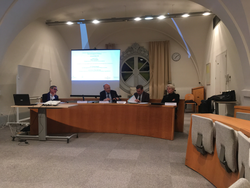Sectorial Analysis

March 3, 2018
Events : JoRC

Among all the things that were important to remember, one of the things that struck me most in the extraordinary conference of the President of the Court of Justice of the European Union Koen Lenaerts on "Europe of the Compliance "held on March 2, 2018 was his ability to make" live Europe ". Not only to make it understand but also to make it "live". Here is the challenge: that compliance is not an accumulation of processes without reason and without flesh, but a living whole taking its meaning into consideration of the human being, a person whose judge is concerned.
On 2 March 2018, Koen Lenaerts therefore came to an amphitheater at the University Panthéon-Assas (Paris 2) to inaugurate the series of conferences organized by the Journal of Regulation & Compliance (JoRC), a cycle that has the general title: Pour une Europe de la Compliance (For the Europe of Compliance). The School of Public Affairs of Sciences Po, the Department of Economics of Sciences Po, the Ecole doctorale de droit privé (Doctoral School of Private Law) at the Université Panthéon-Assas- Paris 2 (Panthéon-Assas University - Paris 2) and the School of Law of the University Panthéon-Sorbonne (Paris I), are associated with this cycle. Many personalities will take the floor.
Presented by Professor Thierry Bonneau, the conference made by President Koen Lenaerts was extremely rich and solid, perfectly constructed. Everyone had known the quality of the conference to be delivered by the President of the CJEU. The content of his demonstration will be found in the article he will give for the book that will be published in the Régulations & Compliance Series edited by Marie-Anne Frison-Roche at Éditions Dalloz. And the reader will find all the strength of this demonstration. This is necessary to venture into this area of "Compliance" : Koen Lenaerts recalled that we were still looking for the definition and a French term that would do justice to a satisfactory definition!footnote-90. This question was echoed by Antoine Garapon in his discussion.
Embodying the firmness that must be shown when words are uncertain, President Koen Lenaerts emphasized that the European Union is based on "Rule of Law". This means that the behaviors must respect Law. For that, - and that is why it is necessary to take in the literal sense the English expression "to comply with", the enterprise must not be passive but to make sure that its behavior is actually respectful of legal prescriptions. In this, there is a general paradigm shift, which inverses the relation betwenn the operator and the rules, from the Ex Post to the Ex Ante!footnote-89 as the entreprise has to be itself active to secure the effectiveness of the rule of Law. This internalization of the rule by the company develops both a procedural culture and a behavioral culture, in which companies can express an ethical dimension and build a "Trust Pact" !footnote-88 with states and public authorities. This change has been brought about by globalization, since states no longer have the means to impose ethical norms of behavior on businesses through the Ex Post intervention of their jurisdiction, but States like companies are gaining the benefit of this internalisation of rules in compagnies because the Compliance is inseparable from the accountability by which the company is compelled to justify that it actually tends to achieve the overall goals assigned by the public authority.
Thus, after exposing the general movement by which Europe opened up to this upheaval, President Koen Lenaerts took on three technical dimensions crossed by this new conception. The first is the Financial Markets Law. The second is Competition Law, about which the President has notably developed the Court's reflections on whether the adoption of a compliance program by an enterprise found to have violated Competition Law, in particular by "negligence" is neutral, or constitutes a mitigating circumstance or constitutes an aggravating circumstance. This question was taken up after the presentation in the discussion with the room. The third is that of personal data. Taking again as in a waltz with three times his remarks, the president of the Court of Justice found that the compliance, whereas it consists in transforming the Ex Post into Ex Ante becomes juridicalised and in this the Court of justice holds its not only in Europe but also in relation to the world, without however ever forgetting that it is the States that are drawing up the rules that are the foundation of Europe.
We will find in the article that will be published all these precious elements and no doubt that the elegance of the pen will be equal to that of speech.
But, written exercise requires, the reader will not find what we had the chance to attend: the story of two cases by the one I would prefer to name the "Professor Koen Lenaerts".
Two famous cases, which we teachers, comment and remind in our courses, that students learn and recite, quote in their copies. But never that way.
The first case is the Schrerms case, where the court said that Facebook could not transfer this person's personal data to the United States since he was opposed to it. To make it clear, the President revived it through the litigant, who was a student and for this reason he spoke directly to the students present in the amphitheater. He pointed out that the plaintiff at the origin of the case was a law student, like them. He detailed his situation in Austria, making some quotes in perfect German, pointing out that this student was now at the doctoral stage, inviting students to be brave, as he was. At each episode of the story, the speaker told the students, making some detours on his own student life because finally we were all in family ... Alma Mater. But his hands were telling the story even more: they were thrown themselves into the story, they brewed the space, it seemed as if they themselves were no more grandiloquent than the speaker but found their place exactly , in a magisterial position. Yes, here is a president in front of which companies have a hard time hiding the truth, a president with such firm hands and whose torso does not move but turns to the left and right to talk to everyone.
The second story was even more beautiful. The Google Spain case, I know it. I even know it by heart. I read it, commented on it, cited it a lot of times ... But all of a sudden that's what happened to a small Spanish merchant: President Koen Lenaerts told us his story, and I rediscovered the case. A small Spanish shopkeeper, whose name the speaker uttered in perfect Spanish, obtained from the Court of Justice that his "right to be forgotten" was recognized. President underlined the apparent paradox of his insistence for the appearance of his surname in the judgment by which this person had thus obtained the erasing of his surname! Yes, I did not notice ... Why did he ask for the mention of his name in the right to have his name deleted? Because it's a matter of honor. This is what the speaker insisted: do not joke with honor. And if you do, even Google will lose.
The merchant had been subject to a forced property sale procedure because of financial difficulty, which spanish newspapers had echoed. His honor was been trampled. Then, by a happy return of fortune, he had recovered his property, his prosperity, his reputation. But from that, the press had not talked about it. Some lines in a newspaper of legal announcements, but that it is nothing for the human soul. That's why he wanted these mechanical digital links to disappear, which always and for all end up with articles presenting him as a wretch without ever ending up with articles presenting him as a prosperous merchant (because of the non-existence of these second articles).
The speaker emphasized this dimension very much. And we know that the General Regulations that will come into force in May 2018 on personal data, which intrigues so much the Americans, draws in the judgment Google Spain its main solution in the matter: this "right to be forgotten" , subjective right so strange.
He emphasized this dimension very much. And we know that the General Regulations that will come into force in May 2018 on personal data, which intrigues so much the Americans, draws in the judgment Google Spain its main solution in the matter: this "right to be forgotten" , subjective right so strange.
Listening to President Koen Lenaerts, how not to think of Carbonnier? to his articles of it, especially on sociological rule : "small causes, great effects"?
From this conference, it will remain a great article, but as in the theater, where the ephemeral is part of the beauty of this art, what were these two stories, told by the one who knew how to listen when it was necessary to decide the two cases, stories told with the two firm hands that danced inviting students to enter this round, even as the President of the Court of Justice had to leave immediately to Luxembourg to hold such heavy obligations, yes it was simply beautiful .

June 20, 2016
Breaking news

Little is known about how to ‘regulate the Internet’…
Outline solutions, however, do seem to have to be found in ex-post mechanisms since Regulation (broadly speaking) understand ex-ante and ex-post mechanisms as a continuum, and since Regulators increasingly concentrate ex-post mechanisms in their hands as an effective way to ensure execution of the ex-ante prescriptions they themselves elaborated.
Ex-ante mechanisms aim at making algorithms more ‘loyal’.
As long as we hope for devices to be trustworthy and to be held accountable for their ‘loyalty’, we give merits to the idea that we probably should “take liability seriously”.
On June 14, 2016, the Californian father of one of the victims of the 11/13/2015 Paris attacks filed a suit in a U.S. District Court to prosecute Google, Facebook and Twitter.
The legal dispute is clear.
The applicant based its claim to hold the companies liable on the grounds that they let terrorist groups use their networks: “The suit claims the companies “knowingly permitted” the Islamic State group, referred to in the complaint as “ISIS”, to recruit members, raise money and spread “extremist propaganda” via their social-media services”.
Conversely, the defendants unanimously claimed that they had actively implemented ‘policies’ against extremist material, and that they were working with law enforcement entities to improve regulations on the matter. Self-regulation and ethics versus common liability law.
The companies also pointed out the fact that they were not publishers, hence they could not face liability for the material users post on their networks. This is not, however, the issue at stake: the complaint concerns the use of the network not as a mere way to broadcast messages, but as a way to recruit murderers, provide them with convenient tools to communicate and to prepare criminal operations—allegations for which law does not exempt social media companies from liability.
These allegations are worth being ‘taken seriously’, should the law be unclear on whether the companies could be charged indeed, and should the total exemption from liability of such companies pleading for their ‘neutrality’ be the exception rather than the norm.
The question of principle is thus as follows: is exemption from liability of those who hold the ‘digital space’ together really the norm?
If so, their exemption from liability needs to be extended to a scenario that had not been covered by the law yet. If not, then common liability law is the rightful legal basis to assess whether the companies can be found liable or not—provided that a direct causal link between the unlawful act and an actual harm suffered by the applicant can be demonstrated.
The legal dispute is clear.
Dec. 1, 2014
Breaking news

However, France and Germany have asked 27 November 2014 to the European Commission to take steps against those who hold the platforms on the Internet, including search engines. Everyone knows that this is the famous "GAFA" (Google, Apple, Facebook and Amazon).
It seems that the EU institutions fit, since the European Parliament voted on November 27 a text saying that it could ban these companies to monetize their platform activities themselves.
By their regulatory perspectives, Europe gets "retrograde" against the US dynamism?
At first glance, one might say. But it may be that these companies have become "critical", they take the heart of the digital economy, or even the knowledge economy and social cohesion. In such cases, the regulation of these objective phenomena justifies intervene directly in companies in which the social group comes to identify itself. If the company comes to stifle others, it is not that it stifles competition only, but innovation and free expression.
Then pass the mere vigilance competition law instruments of regulation, common in banking and financial law, such as transparency requirements.
This demonstrates Regulation and Supervision meet when companies become crucial.
Updated: June 26, 2012 (Initial publication: June 19, 2012)
Breaking news

